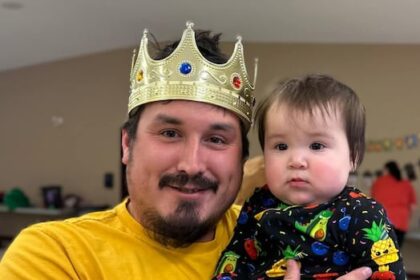NSCC Middleton campus held an event to help individuals legally change their names and gendersPublished Nov 19, 2025Last updated 25 minutes ago6 minute readLeo Kepler says they walked out of that room lighter, like a piece of the weight they had been carrying their whole life, finally lifted when they completed paperwork to change their name. ContributedArticle contentFor Leo Kepler, the thought of changing their name always felt like a daunting process.THIS CONTENT IS RESERVED FOR SUBSCRIBERS ONLY.Subscribe now to access this story and more:Unlimited access to the website and appExclusive access to premium content, newsletters and podcastsFull access to the e-Edition app, an electronic replica of the print edition that you can share, download and comment onEnjoy insights and behind-the-scenes analysis from our award-winning journalistsSupport local journalists and the next generation of journalistsSUBSCRIBE TO UNLOCK MORE ARTICLES.Subscribe or sign in to your account to continue your reading experience.Unlimited access to the website and appExclusive access to premium content, newsletters and podcastsFull access to the e-Edition app, an electronic replica of the print edition that you can share, download and comment onEnjoy insights and behind-the-scenes analysis from our award-winning journalistsSupport local journalists and the next generation of journalistsRegister to unlock more articles.Create an account or sign in to continue your reading experience.Access additional stories every monthShare your thoughts and join the conversation in our commenting communityGet email updates from your favourite authorsSign In or Create an AccountorArticle contentThere are a lot of forms to fill out, documents to get notarized, and several steps to follow. It can be overwhelming, and on top of all this are the associated emotions.Article contentArticle contentKepler’s biggest hesitation had always been fear of ridicule from their family, who they say never respected their pronouns, even though they have identified as non-binary since 2005. Now in their forties, most of their family has passed away, and those who remain are no longer part of their life.Article contentArticle content“It’s taken years — and a lot of therapy — to move beyond the weight of that bigotry,” says Kepler.Article contentThat’s why when they heard the Nova Scotia Community College’s Middleton campus was holding a free legal name change workshop this past March in honour of the International Transgender Day of Visibility and to support the 2SGLBTQIA+ community, they were overwhelmed.Article content“It was overwhelming in the best possible sense,” says Kepler.Article content Kentville Legal Aid lawyers Cheri Killam, left, and Daleen van Dyk attended the workshop at the Middleton NSCC campus and notarized documents to help remove barriers for those wanting to change legal names or gender markers. ContributedArticle contentHow it workedArticle contentEvent organizer, Tracey Garber, a personal and career counsellor at the Middleton campus, explains how the day was laid out. In partnership with Legal Aid Nova Scotia, there were lawyers on site to witness documents, and volunteers available to assist with form completion necessary for name or gender marker changes on legal documents.Article contentDaleen van Dyk and Cheri Killam from the Legal Aid office in Kentville were the two lawyers who participated in the event.Article contentArticle contentWhen the opportunity arose to help facilitate name changes and gender identifiers for community members at NSCC Middleton, Killam says they were delighted to be able to help by commissioning documents.Article contentArticle contentAs van Dyk says, people are often intimidated by forms and worry that any mistake will have irreparable consequences. It also takes emotional energy to start the process.Article content“The more we can support and educate people about the process, the better,” she says.Article content“It was wonderful to help remove one of the challenges or barriers people can face when trying to fully assert their identity.”Article contentLongtime dream comes trueArticle contentKepler knows these challenges. Changing their name was something they had always wanted to for as long as they could remember — since they could speak, they say. Unfortunately, they were relentlessly mocked by their family for wanting to be called something different.Article content“That kind of rejection and ridicule created a lot of internalized shame and fear of being ostracized, and those feelings held me back for decades,” they said.Article contentBut not anymore.Article contentOn that day in March, Kepler, who recently graduated from the cartography and geovisualization program at the Centre of Geographic Sciences (COGS), says it was an incredible feeling to walk into the room.Article contentKepler describes that there were rainbow colours everywhere and all kinds of pride flags, which immediately melted a lot of their anxiety. There were tables with literature and some great queer swag to take home, they said.Article content Organizers of a name and gender change event made it welcoming with lots of queer swag. UnsplashArticle contentStaff greeted the workshop participants right away, including Kepler and their partner of 20 years, and helped them all get the right forms. People sat together filling them out while staff circulated, answering questions and offering support.Article contentArticle contentThen Kepler said they met with the visiting lawyers in a semi-private area with dividers, which offered some privacy during that part of the process.Article content“The whole experience was so well thought out and caring,” says Kepler. “Having the support of NSCC — and Tracey in particular — made it feel so much more manageable.”Article contentIt was during this event that Kepler wanted to change both their name and gender marker. They had the applications for each notarized at the event by the visiting lawyers.Article contentIt may seem like a small thing to some, but Kepler says for them, having the lawyers there was a major reason for attending the event. Knowing they didn’t have to pay for a notary lessened the chances of feeling judged by the person when going to have documents notarized. Having to take time off work to get that step done meant a great deal — it showed real thoughtfulness and accessibility in how the event was organized, they said.Article contentArticle content‘Feeling affirmed in our authentic selves’Article contentAfter the event, the next step was for Kepler to complete the fingerprinting process with the RCMP and then mail everything to Vital Statistics. Fingerprinting, explains Kepler, is a standard part of the name-change process for everyone, not something specific to queer folks.Article contentDuring the event, Kepler said the staff were great at explaining each step clearly, so nothing felt confusing or overwhelming.Article contentOnce completed, Kepler said the whole experience felt profoundly affirming.Article content“I know that might sound simple, but for many of us, feeling affirmed in our authentic selves is not something we’ve had the privilege to experience before,” they said. “What might look like a small school or community event from the outside can actually be lifesaving for people like me.”Article contentFor Kepler, they say it’s hard to put into words just how important being able to change names and gender markers is, as it reaches the very core of who you are. Many cisgender people can’t fully grasp the level of disconnect that comes from being called by an identifier that doesn’t reflect your true self — it’s like a quiet kind of daily pain, they say.Article content“Finally being able to hold agency over my identity is something I’m only now beginning to experience, and it feels like freedom — something I’ve waited nearly 50 years to feel,” says Kepler.Article contentBeing able to change your documents isn’t just about paperwork, notes Kepler. It’s about being seen and respected as who you truly are.Article content“Every time I have to present ID that doesn’t match my lived reality, I’m forced into a moment of vulnerability, sometimes even danger,” they note.Article contentThis event did not just profoundly affect the participants, but so did it the others involved.Article contentArticle content“People were so relieved to have this step taken care of, and it was one of the most rewarding experiences for us, too,” says van Dyk.Article contentKillam agrees, saying it was such a joy to see people thrilled that they were on the cusp of fully having their identity confirmed and legal.Article content“There were many people with tears in their eyes. There was a steady stream of overjoyed people, which was a rare treat for us,” says Killam.Article content The Nova Scotia Community College campus in Middleton organized an event that helped people legally change their names and genders. UnsplashArticle content‘Win-win-win’Article contentEvents like this are important, says Garber, and need to be done with care.Article contentGiven that the legal name and gender marker change process affects a particularly vulnerable and equity-deserving community, Garber says she believes it is essential to approach this work through a lens of allyship — centering the voices of those with lived experience.Article contentKepler wholeheartedly believes other institutions and schools should offer opportunities like the one done at the NSCC Middleton campus.Article contentArticle content“It’s harmless for those who don’t need it, a great example of positive community engagement for the institution, and literally life-changing — even life-saving — for those who do. It’s a win-win-win,” they say.Article contentIn the future, Kepler says they would love to see future fundraising initiatives or a dedicated legal assistance fund to help those who want to participate but face financial barriers. The costs associated with this process can be a real obstacle for many, they note.Article contentFor anyone wishing to organize a similar event, Garber says they have created a “how-to” document. She can be reached at the NSCC Middleton campus.Article content“Now, having accurate documentation means safety, dignity, and authenticity in everyday life — things most people don’t have to think twice about, but for us, they mean everything,” Kepler said.Article contentEvents like this are not about paperwork, Kepler added. It was a day of empowerment, affirmation, and belonging. Kepler says it showed that institutions can play a powerful role in making real, tangible change for marginalized people when they approach it with empathy and intention.Article content
How a name change event was ‘literally life-changing’ for Nova Scotia person











